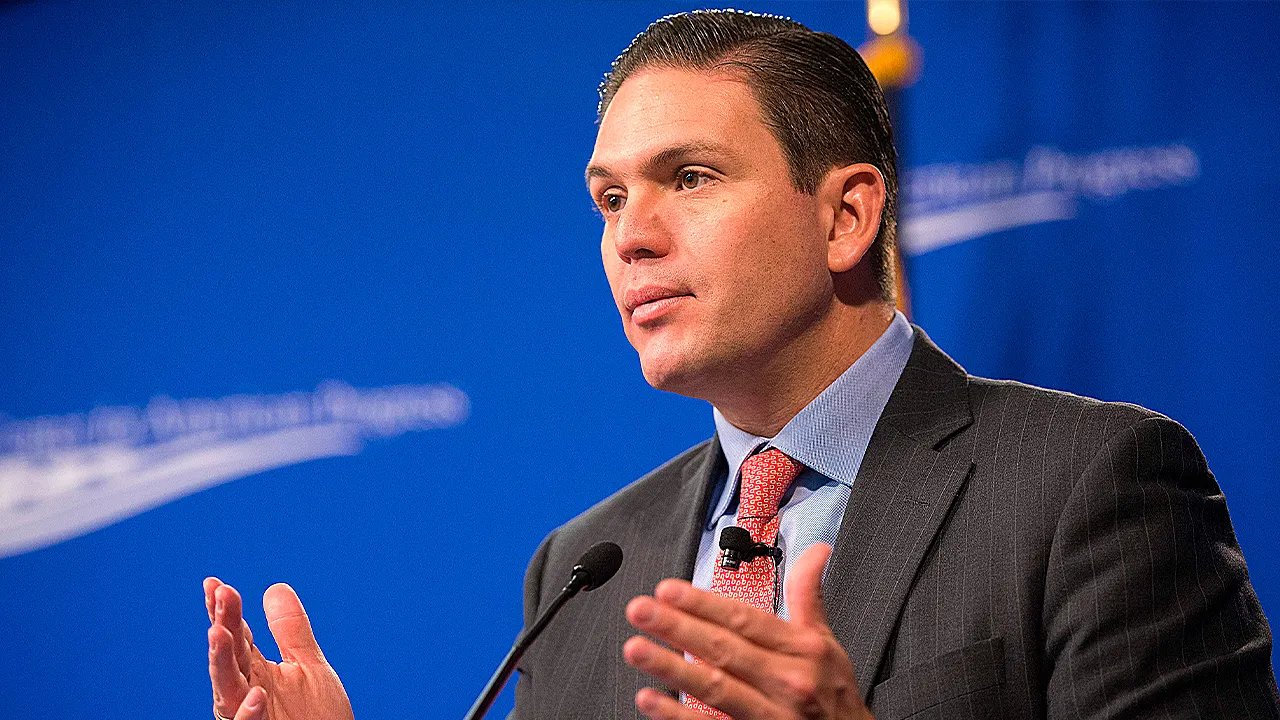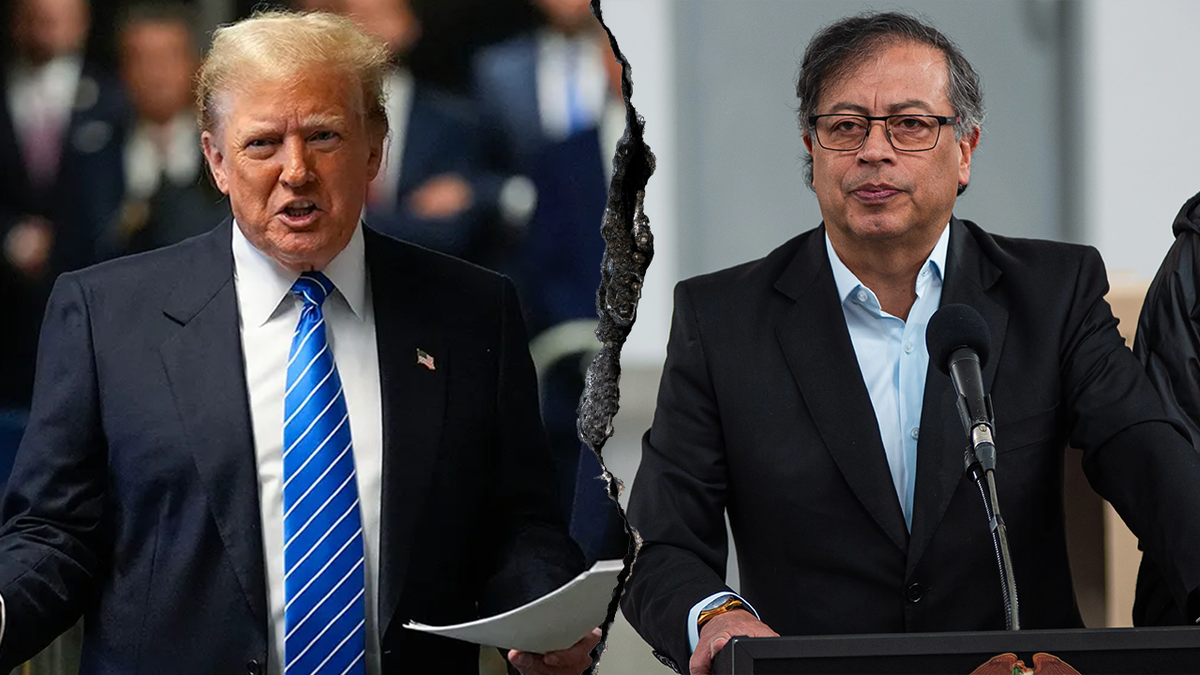INTERNACIONAL
Trans bathroom policies have 10 days to go, Trump Education Department warns 5 Virginia school districts

NEWYou can now listen to Fox News articles!
The Department of Education is giving five northern Virginia school districts ten days to fix their transgender bathroom policies or face «enforcement action,» the agency said Friday.
Public school districts in Loudoun County, Fairfax County, Prince William County, Alexandria City and Arlington were all found to be in violation of Title IX after an investigation by the Education Department’s Office of Civil Rights that began in February, according to a press release shared Friday.
The release cited a June ruling by the Supreme Court, which the department said acknowledged that a person’s identification as «transgender» is distinct from a person’s biological sex.
TRUMP ADMIN CRACKS DOWN ON OREGON AND VIRGINIA FOR DEFYING TITLE IX AND WOMEN’S SPORTS EXECUTIVE ORDER
Sign outside a gender-neutral restroom. (Istock/AndreyPopov)
«The investigation was based on complaints alleging that the [school districts] have similar anti-discrimination policies pertaining to ‘transgender-identifying’ students, which violate the sex-based protections of Title IX,» the release said.
«The [districts] are also the subject of several lawsuits, informal complaints and reports, which allege that students in the (districts) avoid using school restrooms whenever possible because of the schools’ policies and that female students have witnessed male students inappropriately touching other students and watching female students change in a female locker room.»
Craig Trainor, the Department of Education’s acting assistant secretary for civil rights, blasted the Biden administration for tolerating such behavior, adding it’s time for «northern Virginia’s experiment with radical gender ideology» to come to an end.
The Education Department’s non-compliance finding prompted the agency to issue a proposed resolution agreement whereby each school district can take corrective action to prevent any enforcement actions by the Trump administration.
That action would require the districts to rescind any policies or regulations allowing students to access bathrooms, locker rooms or other intimate facilities on the basis of their preferred gender identity as opposed to their biological sex.
SCANDAL-PLAGUED SCHOOL DISTRICT REFERRED TO DOJ AFTER ANOTHER TRANSGENDER LOCKER ROOM CONTROVERSY

Activists march in support of gender identity-based bathroom access. The Biden-era policies they supported are now being opposed by the Trump administration. (Mark Kerrison/In Pictures via Getty Images)
The districts will also be required under the agreement to issue letters to each school it oversees within its district, explaining that any future policies related to bathrooms, locker rooms or other intimate spaces must separate students on the basis of sex and not gender identity.
The districts would also be compelled under the agreement to adopt «biology-based definitions» of the words «male» and «female» to be used in all practices and policies.
The Department of Education gave the school districts 10 days to voluntarily agree to these demands or risk «imminent» consequences, including a potential referral to the Department of Justice.
VIRGINIA SCHOOL DISTRICT ACCUSED OF RELIGIOUS DISCRIMINATION IN TRANSGENDER LOCKER ROOM CASE
«Today, we at Defending Education are incredibly gratified to learn that a group of Northern Virginia School Districts — many of which were ground zero for the social experimentation of transgender ‘inclusion’ in women’s sports, bathrooms and private spaces — are now facing the music for failing to adhere to the plain text and meaning of Title IX,» said Sarah Parshall Perry, vice president and legal fellow at Defending Education.
«As a mother, as a Virginian and as former senior counsel to the assistant secretary for civil rights at the U.S. Department of Education, I am encouraged to see that this administration is taking the enforcement of long-standing civil rights laws seriously,» Perry continued.
«Title IX was passed to guarantee women’s educational equality in its myriad manifestations. But intransigent schools in the commonwealth seem to have forgotten that.»

The hallway of a school (iStock)
CLICK HERE TO GET THE FOX NEWS APP
The school districts all confirmed receipt of the resolution agreements issued to them by the Department of Education and are conducting a review to determine next steps. They all also expressed a commitment to following federal and state laws while simultaneously fostering a welcoming, inclusive and supportive environment for students.
INTERNACIONAL
Murió Dionysis Savvopoulos, ícono de la música griega
El popular cantautor griego Dionysis Savvopoulos, conocido por sus letras alegóricas y profundamente poéticas que abordaban la política, la identidad y la sociedad griegas, falleció. Tenía 80 años.
Savvopoulos, figura destacada de la escena cultural e intelectual griega, falleció el martes por la noche, según anunció su familia en su cuenta oficial de redes sociales. El músico había estado hospitalizado en los últimos días y llevaba varios años luchando contra el cáncer.
Conocido por su apodo Nionios —un apodo común para Dionisio—, Savvopoulos saltó a la fama en la década de 1960, alcanzando fama nacional con sus canciones sutilmente revolucionarias durante la dictadura militar de 1967-1974. Fue encarcelado brevemente por la junta, y sus canciones se convirtieron en himnos de resistencia para jóvenes y disidentes en Grecia.
Los homenajes a Savvopoulos llegaron desde todo el mundo político y cultural griego.

“No quiero creerlo, pero nuestro Dionisio ya no está aquí”, publicó el primer ministro Kyriakos Mitsotakis en sus redes sociales. “Savvopoulos se ha ido, dejando una profunda huella en la música, las letras y el estilo público. Porque con su trabajo y su postura, demostró ser un compositor maravilloso. Un griego sensible”.
Nacido en Tesalónica el 2 de diciembre de 1944, Savvopoulos estudió Derecho, pero nunca terminó sus estudios. Se mudó a Atenas en 1963 y comenzó su carrera musical, actuando en pequeños clubes de la capital griega.
Sus canciones mezclaban múltiples géneros, incluida la música popular griega con elementos de rock y folk-rock, la música de músicos estadounidenses como Bob Dylan y Frank Zappa, así como la música tradicional griega.
Compuso tanto la música como la letra de la mayoría de sus canciones, con un profundo contenido político, romántico y humorístico. Su álbum debut, “Fortigo” (que significa “Camión”), se lanzó en 1966 y se convirtió en un gran éxito, catapultándolo a la fama con su combinación de comentarios políticos, influencias del rock y modismos folclóricos griegos.

Consolidó su éxito con su segundo álbum, “The Fool’s Garden”, publicado tres años después, en 1969, durante la dictadura militar. Savvopoulos se convirtió rápidamente en una de las principales voces de la disidencia artística griega, y para la caída de la junta en 1974, era considerado uno de los compositores griegos más importantes y originales de su generación.
En 1972, lanzó el álbum “The Dirty Bread”, que incluía la canción “The Angel Herald”, una adaptación de “The Wicked Messenger” de Bob Dylan, mientras que en 1997 lanzó “The Hotel”, un álbum dedicado a artistas que lo habían inspirado, incluidos Bob Dylan, Nick Cave, Jethro Tull, Van Morrison, Lou Reed, Lucio Dalla y otros.
“Fue un gran artista, un hombre extraordinario, apreciado por el pueblo griego por su personalidad, su obra y su contribución al arte”, declaró el presidente griego Konstantinos Tassoulas en un comunicado. “Inflexible, innovador y audaz, encarnó el espíritu de cuestionamiento de la forma más sensible y poética a través de obras que marcaron la historia de la canción griega y se convirtieron en hitos de la cultura moderna de nuestro país”.
Savvopoulos, un talentoso artista escénico, cautivaba a públicos de todas las edades con su música y narrativa. Continuó actuando a lo largo de su carrera, participando en conciertos en vivo tan recientemente como este año, cuando actuó en un festival de música de verano a las afueras de Atenas.

Savvopoulos publicó su autobiografía, “Por qué pasan los años”, a principios de 2025, donde habló abiertamente sobre su batalla contra el cáncer de pulmón, diagnosticado en 2020.
“La muerte es algo inaceptable. Pero una vez que la aceptas, es cuando empiezas a vivir”, dijo en una entrevista televisiva.
A Savvopoulos le sobreviven su esposa Aspa, dos hijos y dos nietos. Los detalles del funeral se anunciarán más adelante, según informó su familia.
(con información de AP)
INTERNACIONAL
How Louvre burglars obtained truck-mounted lift to make off with jewels worth more than $100M

NEWYou can now listen to Fox News articles!
The thieves behind the daring Louvre Museum heist in Paris, France, appear to have used a truck-mounted moving lift — the kind professional movers use to hoist furniture up to apartment windows — in order to scale the building’s second floor, according to Laure Beccuau, the Paris prosecutor.
The burglars pretended they were hiring the freight lift for a move and when the equipment owner or representative arrived to verify the job, the suspects threatened that person, forcing them to hand it over and leave the scene, Beccuau said in an interview with RTL radio, according to The New York Times.
Authorities said the thieves spent less than four minutes inside the Louvre on Sunday morning. They allegedly wheeled the vehicle to the Seine-facing façade, a window was forced open, and two vitrines were smashed.
BRAZEN LOUVRE ROBBERY CREW MAY HAVE BEEN HIRED BY COLLECTOR, PROSECUTOR SAYS
Police secure the area outside the Louvre Museum in Paris, where burglars used a truck-mounted moving lift to reach a second-floor window and steal royal jewelry valued at more than $100 million. (Getty Images)
The thieves made away with a total of eight objects, including a sapphire diadem, necklace and single earring from a set linked to 19th-century queens Marie-Amélie and Hortense. The heist has prompted a national reckoning, with some officials comparing the shock to the 2019 burning of Notre-Dame cathedral.
They also stole an emerald necklace and earrings tied to Empress Marie-Louise, Napoleon Bonaparte’s second wife, and a reliquary brooch. Empress Eugénie’s diamond diadem and her large corsage-bow brooch — an imperial ensemble of rare craftsmanship — were also part of the loot.
WATCH: Louvre security was ‘not up to par’ after jewelry heist, author says
One piece — the emerald-set imperial crown of Empress Eugénie, with more than 1,300 diamonds — was later found outside the museum, damaged but recoverable.
Beccuau said the stolen items were valued at around $102.1 million and that the team investigating the heist has grown to 100 people.
The pieces were not insured, which is not uncommon for state collections because of the prohibitive costs, the Times reported, citing France’s culture ministry. The ministry reportedly said that the state «acts as its own insurer» when works are in their usual place of conservation «given the cost of taking out insurance» and the fact that «the accident rate is low.»

French Crime Scene Officers gesture as they examine the cut window and balcony of a gallery at the Louvre Museum on Oct. 19, 2025. (Kiran Ridley/Getty/Zhang Weiguo/VCG/AP/Zhang Weiguo/VCG/AP)
LOUVRE MUSEUM CLOSED AFTER ROBBERY, FRENCH OFFICIAL SAYS
Beccuau told local media that investigators believe the robbers may have been commissioned by a collector or were purely motivated by the value of the jewels and precious metals, Reuters reported.
«We’re looking at the hypothesis of organized crime,» Beccuau told BFMTV, noting that the thieves could be professionals operating on spec for a buyer.
Beccuau added that if a collector did commission the heist, there is hope that the stolen pieces will remain intact and well-preserved until recovered, the outlet reported. If the thieves acted independently, they may have targeted the jewels for their potential use in laundering criminal proceeds.
«Nowadays, anything can be linked to drug trafficking, given the significant sums of money obtained from drug trafficking,» Beccuau said, according to Reuters.
Investigators are keeping all leads open, but foreign interference has reportedly been largely ruled out in the case.

Forensic police officers arrive at the Louvre Museum after reports of a robbery in Paris, France, on Oct. 19, 2025. (Reuters/Gonzalo Fuentes)
CLICK HERE TO GET THE FOX NEWS APP
The Sunday morning smash-and-grab unfolded just 270 yards from the Mona Lisa.
Prosecutors revealed Monday that a vest, bottle of liquid and equipment left behind at the scene are now being examined.
The Louvre reopened Wednesday morning to crowds under its glass pyramid
Fox News Digital’s Bonny Chu, Ronn Blitzer and The Associated Press contributed to this report.
europe,france,world,crime world,police and law enforcement
INTERNACIONAL
Alliance with US ‘dismantled’ by leftist Petro regime, Colombia’s former defense minister says

NEWYou can now listen to Fox News articles!
Former Colombian Defense Minister Juan Carlos Pinzón warned that the once-close U.S.–Colombia alliance has «collapsed» under President Gustavo Petro, accusing the leftist leader of aligning with Venezuela’s Nicolás Maduro and turning Colombia into a «narco-state.»
Pinzón, who is weighing a presidential run, told Fox News Digital he could «repair U.S.-Colombian relations in a week» and urged international oversight of Colombia’s May elections amid what he called growing cartel influence and political corruption.
«Petro has made himself an ally to [Venezuelan dictator Nicolás] Maduro’s regime, a narco-state, and a regime that is held mainly by the Cartel de los Soles,» Pinzón said. «He has justified the existence of drug trafficking in Colombia … he has aligned himself with the idea of something that he calls ‘Total Peace,’ which implies that he’s providing benefits to drug traffickers and terrorist organizations and in general terms to organized crime.»
Relations between Washington and Bogotá — historically one of the closest U.S. security partnerships in Latin America — have deteriorated sharply under Petro, who has sought warmer ties with Caracas while distancing Colombia from the U.S. and Western allies.
TRUMP DOUBLES DOWN ON COLOMBIA CRACKDOWN, CALLS PETRO ‘LUNATIC,’ VOWS TO END ALL US PAYMENTS OVER DRUGS
Colombia’s former defense chief and Ambassador to the U.S. Juan Carlos Pinzon (right) floats a run for the presidency. (Jonathan Ernst/Reuters)
During his tenure as defense minister from 2011 to 2015 under President Juan Manuel Santos, Pinzón oversaw some of Colombia’s most aggressive operations against the FARC and other armed groups, helping drive coca production and kidnappings to historic lows. As ambassador to Washington from 2015 to 2017, he helped secure Colombia’s designation as a major non-NATO ally, expanding intelligence sharing and military training programs with the U.S. — partnerships he now says have been «dismantled» under Petro.
Under Petro’s «Total Peace» policy, the Colombian government negotiates directly with armed criminal groups in an effort to end decades of internal conflict and integrate fighters into civilian life. Critics, including Pinzón, say the initiative has legitimized cartels and weakened the country’s security forces.
«Homicide has gone up, terrorist actions have gone up, kidnappings have gone up, and the killing of police officers and military is increasing,» he said. «All this is very bad for my country. And this is why I’m so committed to fight this, to confront this.»
TRUMP ADMIN REVOKES COLOMBIAN PRESIDENT’S VISA OVER ALLEGED ‘RECKLESS AND INCENDIARY ACTIONS’

President Donald Trump and Colombian President Gustavo Petro. (Getty Images)
Pinzón, who previously served as both defense minister and ambassador to Washington, is positioning himself as a pro-U.S. alternative ahead of Colombia’s 2026 presidential race. «I might announce a decision in the coming weeks,» he said. «That’s something that I’m really considering.»
He also called for international election monitoring, warning that criminal networks could interfere in the vote. «If I were to ask something to the world today and to the international community — to the U.S., to the European Union, and even to countries in Asia — it’s that they make sure Colombian elections are not tainted by drug trafficking, illegal mining or terrorist hands,» Pinzón said.
After a recent spat where Petro accused the U.S. of killing a Colombian fisherman in one of its seven Caribbean strikes targeting drug traffickers, Trump announced he would cut off all counter-narcotics aid to Colombia and hike tariffs on the nation.
Pinzón urged Washington not to punish ordinary Colombians for Petro’s policies.
«It’s not regular Colombians who are doing this,» he said. «Most of us completely disagree with what is going on under Petro. We don’t want to see tariffs that can affect jobs and businesses in Colombia.»
While he praised Trump’s stance against narco-trafficking and corruption, Pinzón said he hopes the U.S. will avoid cutting counternarcotics aid, which he described as vital to Colombia’s military and police forces on the front lines of the drug war. «Our military and police are the real fighters against drugs,» he said. «They continue to sacrifice, they continue to confront terrorism and drug trafficking. If that support disappears, it’s the criminals who are going to benefit.»
Instead, Pinzón said Washington should focus on targeted financial sanctions — such as those imposed by the Treasury Department’s Office of Foreign Assets Control (OFAC) — to hit specific traffickers, corrupt officials and their enablers rather than imposing measures that «hurt regular Colombians.» «We would prefer OFAC-style sanctions on the people committing crimes,» he said, «not policies that punish those who oppose Petro’s agenda.»
Looking ahead to potential ties with Washington, Pinzón said he could quickly rebuild the partnership through renewed security and intelligence cooperation, technology exchange and educational programs.

«Petro has made himself an ally to Maduro’s regime, a narco-state, and a regime that is held mainly by the Cartel de los Soles,» Pinzón said. (LUIS ACOSTA/AFP via Getty Images)
TRUMP GOES ALL-OUT AGAINST COLOMBIA’S PETRO AFTER CLAIMS DRUG STRIKE KILLED FISHERMAN: WHAT WE KNOW
«I will just come to the U.S., speak openly and clearly with President Trump and the U.S. leadership, and speak on the need of creating a security agreement again on intelligence, on air mobility, on technology, on combating drug trade, but also on critical minerals and education,» he said. «We want more Colombians to come to U.S. schools and enhance their capabilities and come back to Colombia to create knowledge, wealth and prosperity. We’re going to be again the closest ally of the United States strategically in the region.»
If Colombia continues on its current course, Pinzón warned, it could destabilize the entire hemisphere. «Colombia is a stabilizer at the end,» he said. «If Colombia fails, the whole region will fail.»
Asked if he would seek U.S. backing, Pinzón said he values bipartisan support. «Everybody knows that I will have a very good relationship with the United States, certainly with the current administration, with President Trump,» he said.
CLICK HERE TO DOWNLOAD THE FOX NEWS APP
Pinzón also accused Petro of «abandoning» Colombian citizens during a diplomatic spat with Washington after refusing deportation flights from the U.S. because the migrants were shackled. He said he would cooperate on deportations and be open to broader agreements if asked.
«When Afghanistan fell, we offered the U.S. even to take care of some of the Afghanis if necessary,» Pinzón said. «When you have a strong relationship as the one we used to have between Colombia and the U.S., and we will have if I can get to the presidency, what we’re going to see is a lot of good coordination and a lot of good things for both the people of Colombia and the people of the United States.»
Fox News Digital reached out to the Colombian Embassy for comment but did not receive a response before publication.
latin america,foreign policy,venezuelan political crisis

 CHIMENTOS3 días ago
CHIMENTOS3 días agoLa cruda confesión del Turco Naim a 1 año de la separación de Emilia Attias: «Me di cuenta que hay que aprender a estar solo»

 POLITICA3 días ago
POLITICA3 días agoExigen que Cristina Kirchner y los candidatos de Fuerza Patria aclaren si fueron financiados por el narco venezolano

 CHIMENTOS2 días ago
CHIMENTOS2 días agoPampita recibió un video inesperado de su hija Blanca en el Día de la Madre y no pudo contener la emoción














